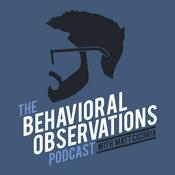En este episodio, Miguel conversa con María Sánchez, una profesional con un impacto notable en la formación de analistas de conducta en España y Latinoamérica. La charla gira en torno al Behavioral Skills Training (BST) o Entrenamiento de Habilidades Conductuales: qué es, cómo se aplica en la práctica y por qué sigue siendo una de las herramientas más efectivas para entrenar tanto a profesionales como a familias.
María comparte su recorrido profesional, que comienza en Inglaterra en un centro para niños con autismo y evoluciona hacia su trabajo en PECS, donde encontró su vocación inesperada en la supervisión y formación de otros profesionales. Trabajó en la capacitación de profesionales en Argentina, Uruguay, Chile, Costa Rica y España, observando de primera mano el poder transformador de la comunicación aumentativa, especialmente en niños no verbales que comienzan a desarrollar estructuras de lenguaje más complejas.
Durante la pandemia, y tras el cierre inicial en Italia, María reinventó su práctica y creó 360 Online, un proyecto de formación remota para garantizar que profesionales en regiones aisladas pudieran acceder a entrenamientos RBT e IBT de calidad. Desde entonces, ha formado a cientos de estudiantes a través de clases sincrónicas, colaboraciones con centros en Latinoamérica y sesiones a distancia altamente prácticas.
Miguel y María profundizan en el procedimiento BST —instrucciones, modelado, juego de roles y retroalimentación—, explorando cómo implementarlo eficazmente con adultos, cómo dar feedback específico sin sobrecargar, y cómo equilibrar correcciones con reconocimiento positivo. También dialogan sobre las ventajas y desafíos de entrenar a distancia, la importancia ética de proteger la privacidad de clientes y familias, la necesidad de fomentar ambientes de aprendizaje seguros y empoderadores, el rol del telehealth en la generalización de habilidades y las demandas formativas reales en España y Latinoamérica, donde muchos profesionales tienen apenas una o dos horas semanales para cumplir con las 40 horas requeridas.
Antes de cerrar, María ofrece consejos esenciales para quienes están en el campo del análisis de conducta, subrayando la importancia del trabajo en equipo, la práctica deliberada y la humildad profesional.
BOP in English: BST with María Sánchez
In this episode, Miguel speaks with María Sánchez, a professional with a remarkable impact on the training of behavior analysts across Spain and Latin America. The conversation centers on Behavioral Skills Training (BST)—what it is, how it is applied in practice, and why it remains one of the most effective tools for training both professionals and families.
María shares her professional journey, which began in England at a center for children with autism and later led her to her work with PECS, where she unexpectedly discovered her passion for supervision and professional training. She provided training to professionals in Argentina, Uruguay, Chile, Costa Rica, and Spain, witnessing firsthand the transformative power of augmentative communication, especially in nonverbal children who begin developing more complex language structures.
During the pandemic—and after the initial shutdown in Italy—María reinvented her practice and created 360 Online, a remote training project designed to ensure that professionals in isolated regions could access high-quality RBT and IBT training. Since then, she has trained hundreds of students through synchronous classes, collaborations with centers across Latin America, and highly practical remote sessions.
Miguel and María dive into the *BST procedure—instructions, modeling, role play, and feedback—*discussing how to implement it effectively with adults, how to provide specific feedback without overwhelming, and how to balance corrections with positive reinforcement. They also explore the advantages and challenges of remote training, the ethical importance of protecting client and family privacy, the need to foster safe and empowering learning environments, the role of telehealth in skill generalization, and the training demands faced in Spain and Latin America, where many practitioners have only one or two hours per week to complete the required 40 hours.
Before wrapping up, María shares essential advice for those in the field of behavior analysis, emphasizing teamwork, deliberate practice, and professional humility.



